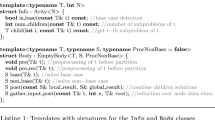Abstract
Multicore clusters are widely used to solve combinatorial optimization problems, which require high computing power and a large amount of memory. In this sense, Hash Distributed A* (HDA*) parallelizes A*, a combinatorial optimization algorithm, using the MPI library. HDA* scales well on multicore clusters and on multicore machines. Additionally, there exist several versions of HDA* that were adapted for multicore machines, using the Pthreads library. In this paper, we present Hybrid HDA* (HHDA*), a hybrid parallel search algorithm based on HDA* that combines message-passing (MPI) with shared-memory programming (Pthreads) to better exploit the computing power and memory of multicore clusters. We evaluate the performance and memory consumption of HHDA* on a multicore cluster, using the 15-puzzle as a case study. The results reveal that HHDA* achieves a slightly higher average performance and uses considerably less memory than HDA*. These improvements allowed HHDA* to solve one of the hardest 15-Puzzle instances.
Access this chapter
Tax calculation will be finalised at checkout
Purchases are for personal use only
Similar content being viewed by others
Notes
- 1.
Efficiency is defined as Sp/N, where Sp is the speedup of the parallel algorithm over the sequential algorithm and N is the number of workers/cores used.
- 2.
15 14 13 12 10 11 8 9 2 6 5 1 3 7 4 0.
References
Hart, P., et al.: A formal basis for the heuristic determination of minimum cost paths. IEEE Trans. Syst. Sci. Cybern. 4(2), 100–107 (1968)
Russel, S., Norvig, P.: Artificial Intelligence: A Modern Approach, 2nd edn. Prentice Hall, Upper Saddle River (2003)
Kishimoto, A., et al.: Evaluation of a simple, scalable, parallel best-first search strategy. Artif. Intell. 195, 222–248 (2013)
Sanz, V., et al.: Scalability analysis of Hash Distributed A* on commodity cluster: results on the 15-puzzle problem. In: Proceedings of PDPTA 2016, 221–230. CSREA Press, Georgia (2016)
Burns, E., et al.: Best-first heuristic search for multicore machines. J. Artif. Intell. Res. 39(1), 689–743 (2010)
Sanz, V., et al.: On the optimization of HDA* for multicore machines. Performance analysis. In: Proceedings of PDPTA 2014, pp. 625–631. CSREA Press, Georgia (2014)
Sanz, V., et al.: Performance tuning of the HDA* algorithm for multicore machines. In: Computer Science and Technology Series 2015. EDULP, La Plata (2015)
Chow, E., et al.: Assessing performance of hybrid MPI/OpenMP programs on SMP clusters. Technical report, UCRL-JC-143957. Lawrence Livermore National Laboratory, California (2001)
Rabenseifner, R., et al.: Hybrid MPI, OpenMP parallel programming on clusters of multi-core SMP nodes. In: Proceedings of PDP 2009, pp. 427–436. IEEE Computer Society, Washington, D.C. (2009)
Hager, G., et al.: Introduction to High Performance Computing for Scientists and Engineers, 1st edn. CRC Press, Boca Raton (2010)
Kumar, V., et al.: Parallel best-first search of state-space graphs: a summary of results. In: Proceedings of AAAI 1988, pp. 122–127. AAAI Press, California (1988)
Vidal, V., et al.: Parallel AI planning on the SCC. In: 4th Many-Core Applications Research Community (MARC) Symposium, pp. 15–20. Postsdam University Press (2011)
Dijkstra, E.W.: Shmuel Safra’s version of termination detection. EWD-Note 998. Department of Computer Sciences, University of Texas, Austin (1987)
Korf, R.: Depth-first iterative-deepening: an optimal admissible tree search. Artif. Intell. 27(1), 97–109 (1985)
Brüngger, A.: Solving hard combinatorial optimization problems in parallel: two cases studies. Ph.D. thesis, ETH Zurich, Dissertation ETH No. 12358 (1998)
Brüngger, A., et al.: The parallel search bench ZRAM and its applications. Ann. Oper. Res. 90, 45–63 (1999)
Author information
Authors and Affiliations
Corresponding author
Editor information
Editors and Affiliations
Rights and permissions
Copyright information
© 2017 Springer International Publishing AG
About this paper
Cite this paper
Sanz, V., De Giusti, A., Naiouf, M. (2017). A Hybrid Parallel Search Algorithm for Solving Combinatorial Optimization Problems on Multicore Clusters. In: Ibrahim, S., Choo, KK., Yan, Z., Pedrycz, W. (eds) Algorithms and Architectures for Parallel Processing. ICA3PP 2017. Lecture Notes in Computer Science(), vol 10393. Springer, Cham. https://doi.org/10.1007/978-3-319-65482-9_62
Download citation
DOI: https://doi.org/10.1007/978-3-319-65482-9_62
Published:
Publisher Name: Springer, Cham
Print ISBN: 978-3-319-65481-2
Online ISBN: 978-3-319-65482-9
eBook Packages: Computer ScienceComputer Science (R0)




